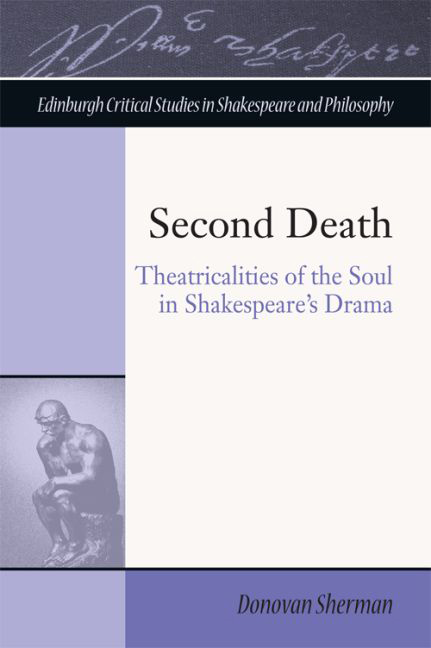Book contents
- Frontmatter
- Contents
- Acknowledgements
- Series Editor's Preface
- Introduction: Conspiring Elements
- 1 This Tough World
- 2 Governing the Wolf: Soul and Space in The Merchant of Venice
- 3 Wounding the Wound: The Monuments of Coriolanus
- 4 Mourning the Present: The Elegy of The Winter's Tale
- Conclusion: The Semi-Theatrical Prejudice
- Notes
- Index
Conclusion: The Semi-Theatrical Prejudice
Published online by Cambridge University Press: 15 September 2017
- Frontmatter
- Contents
- Acknowledgements
- Series Editor's Preface
- Introduction: Conspiring Elements
- 1 This Tough World
- 2 Governing the Wolf: Soul and Space in The Merchant of Venice
- 3 Wounding the Wound: The Monuments of Coriolanus
- 4 Mourning the Present: The Elegy of The Winter's Tale
- Conclusion: The Semi-Theatrical Prejudice
- Notes
- Index
Summary
I began with a desire to speak with the dead.
Stephen GreenblattWhy seek ye the living among the dead?
Luke 24: 5In this pastiche dialogue, Greenblatt's famous confessional opening to his Shakespearean Negotiations finds a bewildered answer from the angels that attend Jesus's empty tomb. The angels’ words reappear in the Quem Quaeritis liturgical trope, which, according to a popular genealogy, theatricalised the medieval church: a dramaturgical climax that hinges on a revelation of absence, which in turn confirms an awakened presence elsewhere. The mildly necromantic impulses of the present-day early modern scholar, then, mimic the motivating mystery of the theatre: Why do we try to find signs of life in a medium that, as Herbert Blau memorably has put it, consists of watching people ‘dying in front of your eyes?’ What do we desire when we see a reflection of our consciousness, embodied and oftentimes bloodied, but not altogether alive, in the traffic of the stage?
This book has found in Shakespeare's drama the suggestion that these questions mirror the means by which early modern England explored the precarious limits of death and life through the figure of the soul. But for Shakespeare, these limits, culturally parsed out carefully in rituals of death – reciting the mythology of metempsychosis, effacing the material monuments, marking the limits of sense-making and mastery in poetic elegies – are also the limits of the human within the human. Each ritual, furthermore, carries with it a self-collapsing knowingness. Metempsychosis is acknowledged as false, the monuments must be dissolved to be realised, and the elegy admits its own incapacity as the source of its potency. The ritual, like the mnemosunon of wasted ointment that Jesus valorises, consists of conscripting its own seeming failure as a form of affirmation. So too does the soul bury within the living the potential of life's undoing, a fragment of death that threatens to cancel out confirmations of full-bodied existence. Shylock, Coriolanus and Leontes each encompass the contact point that comprises the soul, and they do so in relentlessly mimetic worlds that insist, desperately at times, on clearer partitions of livelihood.
- Type
- Chapter
- Information
- Second DeathTheatricalities of the Soul in Shakespeare's Drama, pp. 161 - 178Publisher: Edinburgh University PressPrint publication year: 2016



